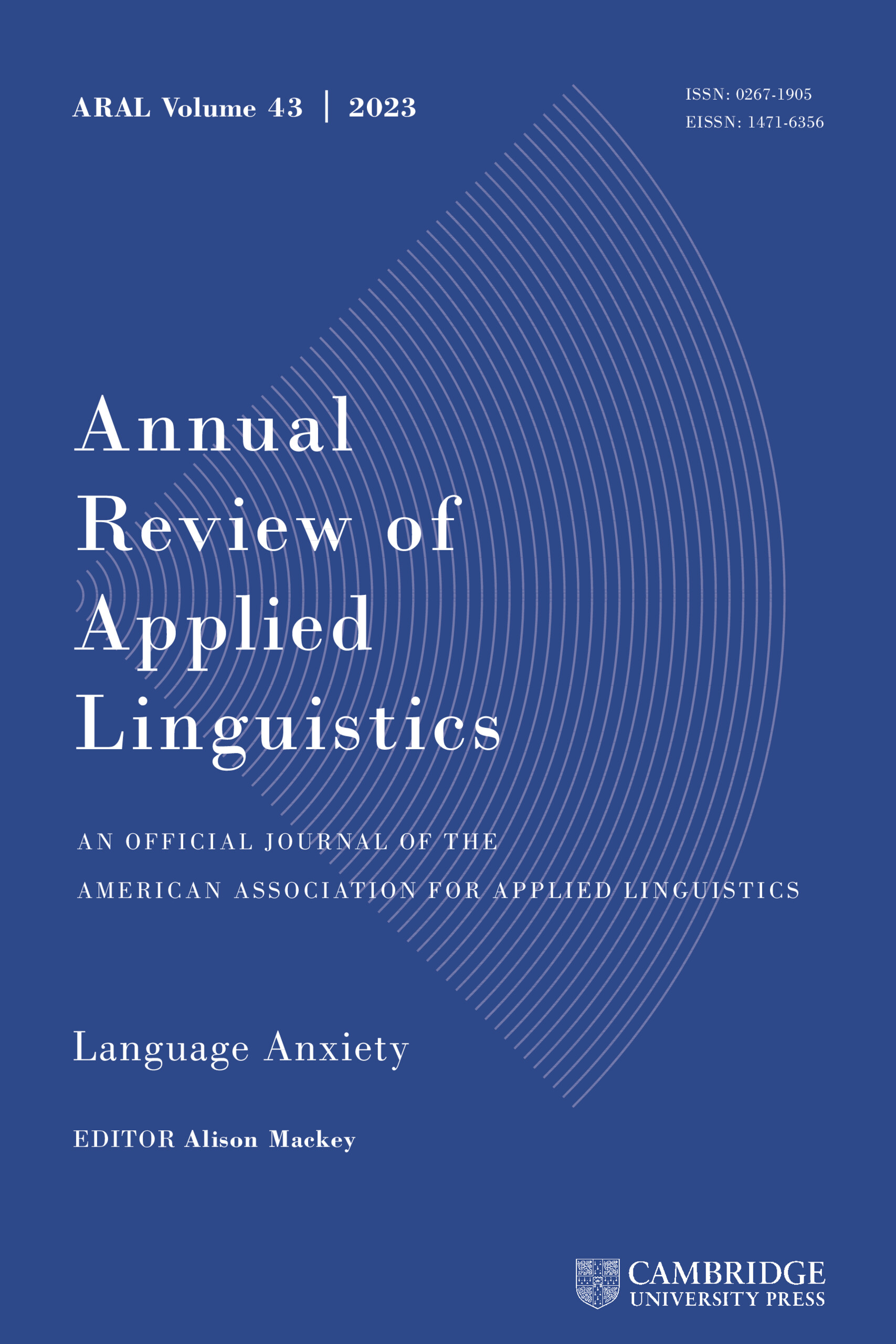Crossref Citations
This article has been cited by the following publications. This list is generated based on data provided by
Crossref.
Ecke, Peter
2004.
Language attrition and theories of forgetting: A cross-disciplinary review.
International Journal of Bilingualism,
Vol. 8,
Issue. 3,
p.
321.
Goral, Mira
2004.
First-language decline in healthy aging: implications for attrition in bilingualism.
Journal of Neurolinguistics,
Vol. 17,
Issue. 1,
p.
31.
Francis, Norbert
2005.
Research Findings on Early First Language Attrition: Implications for the Discussion on Critical Periods in Language Acquisition.
Language Learning,
Vol. 55,
Issue. 3,
p.
491.
De Angelis, Gessica
2005.
Multilingualism and Non-native Lexical Transfer: An Identification Problem.
International Journal of Multilingualism,
Vol. 2,
Issue. 1,
p.
1.
Schmid, M.S.
2006.
Encyclopedia of Language & Linguistics.
p.
74.
FIELD, JOHN
2008.
Face to Face With the Ghost in the Machine: Psycholinguistics and TESOL.
TESOL Quarterly,
Vol. 42,
Issue. 3,
p.
361.
Basham, Charlotte
and
Fathman, Ann K.
2008.
The Latent Speaker: Attaining Adult Fluency in an Endangered Language.
International Journal of Bilingual Education and Bilingualism,
Vol. 11,
Issue. 5,
p.
577.
Tomiyama, M.
2009.
Age and Proficiency in L2 Attrition: Data from Two Siblings.
Applied Linguistics,
Vol. 30,
Issue. 2,
p.
253.
Gentil, Guillaume
O'Connor, Maureen
and
Bigras, Josée
2009.
Le maintien du français chez les fonctionnaires fédéraux anglophones : Impact d'un programme de formation linguistique.
The Canadian Modern Language Review,
Vol. 65,
Issue. 5,
p.
841.
SCHMID, MONIKA S.
2010.
Languages at play: The relevance of L1 attrition to the study of bilingualism.
Bilingualism: Language and Cognition,
Vol. 13,
Issue. 1,
p.
1.
Bardovi-Harlig, Kathleen
and
Stringer, David
2010.
VARIABLES IN SECOND LANGUAGE ATTRITION.
Studies in Second Language Acquisition,
Vol. 32,
Issue. 1,
p.
1.
KEIJZER, MEREL
2010.
The regression hypothesis as a framework for first language attrition.
Bilingualism: Language and Cognition,
Vol. 13,
Issue. 1,
p.
9.
Llewellyn-Williams, Jill
2014.
Reactivation of lapsed languages in the context of modern foreign languages teacher education.
The Language Learning Journal,
Vol. 42,
Issue. 1,
p.
103.
Yeh, Chia-Hsin
and
Lin, Yen-Hwei
2015.
Prosody and Language in Contact.
p.
189.
Coderre, Emily L.
2015.
Neuroscience in Intercultural Contexts.
p.
73.
Bergmann, Christopher
Sprenger, Simone A.
and
Schmid, Monika S.
2015.
The impact of language co-activation on L1 and L2 speech fluency.
Acta Psychologica,
Vol. 161,
Issue. ,
p.
25.
Yildiz, Yasemin
and
Koyuncuoglu, Hande
2017.
The attrition of Turkish as a third language.
ITL - International Journal of Applied Linguistics,
Vol. 168,
Issue. 2,
p.
278.
Park, Eun Sung
2018.
The TESOL Encyclopedia of English Language Teaching.
p.
1.
Dorado Escribano, Guadalupe
2020.
Atrición lingüística, ¿término correcto para este “nuevo” fenómeno lingüístico?.
Pragmática Sociocultural / Sociocultural Pragmatics,
Vol. 8,
Issue. 2,
p.
159.
Mehdiabadi, Fatemeh
Maadad, Nina
and
Arabmofrad, Ali
2020.
The Role of First Language Attrition in Persian Idiomatic Expressions.
Journal of Psycholinguistic Research,
Vol. 49,
Issue. 4,
p.
607.

